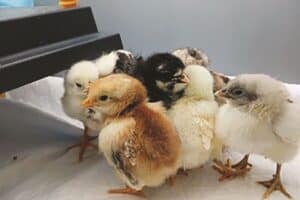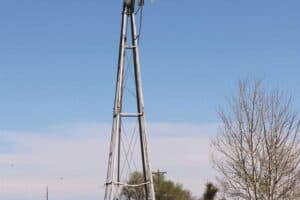Recently, over the course of several nights, I watched ìThe American Farm,î an eight-part docuseries that originally ran on the History channel and is now available for streaming on Hulu. It follows five family farms scattered across the U.S. ó touted as ìan honest tale of risk, reward, hard work and innovation.îI was struck by the challenges faced by the farmers. Mother Nature throws everything she can at them, from drought to flooding to a lightning bolt that destroys a tractor. And there are other obstacles as well, from ever-changing markets for their crops to winged and crawling pests. But the farmers in the series, despite the setbacks, keep working to keep their dreams alive.And that made me think of Yosef Camire and his Ahavah Farm, a family farm in the Peyton area. Itís a regenerative, ìbeyond organicî farm where most of the crops are grown inside hoop houses, benefiting from the sun but largely protected from the elements.Largely, but not completely; Coloradoís unpredictable weather can still wreak havoc. In 2016, a hailstorm rained disaster on Ahavah Farm; in 2019, the farm was decimated by a bomb cyclone. While those are the most visible challenges the farm has faced, they are far from the only ones, Camire says.ìThis is one of the most difficult climates in the country to grow,î he says. ìPeople donít realize how hard it is.î He points to temperature extremes, the intensity of the sun, Coloradoís short growing period and more.But, he says, ìIím really stubborn. I just donít want to give up.îAnd he also feels an obligation to the community. After that severe hailstorm, a GoFundMe campaign was started that raised $6,000 ó not a tremendous amount, Camire says, but enough to get the farm back on its feet. So later, at times when he felt ready to throw in the towel, his wife, Havah, would say, ìWhat about the money they gave us?îAhavah is Hebrew for love ó and that love goes both ways when it comes to the farm and the community. ìItís because of the community that we were able to stay,î Camire says.Yosef and Havah werenít looking to start a farm when they and their four children (now seven) moved to their 40 acres in Peyton in 2014. But plans for a family garden where they would grow pure and nutritious foods for their kids morphed into the farm. Despite the challenges, it has grown dramatically, now with 15 hoop houses, 15 employees and a four-season CSA (Community Supported Agriculture, in which customers pay at the start of a season and then receive produce throughout it).2020 put a damper on that growth, though. Near the end of 2019, Camire was diagnosed with pancreatic cancer. While he was dealing with that news, the COVID-19 pandemic and its related health restrictions dealt a significant blow to the farmís operations, as it did many businesses. So 2020 and 2021 were merely ìyears of survival,î he says.More than three years after his diagnosis, though, Camire says he is doing well. As for the farm, 2022 was a year of recovery and Camire expects that momentum to continue this year and fuel a return to a building phase.As a farm that operates year-round, itís not like thereís ever a lot of time to kick back and relax anyway. The month of January is the closest the farm has to an ìoffseason,î with the winter CSA kicking off in February; this month also sees the return of Ahavahís farmers market, which is held on Fridays at the farm but took a break in January. (The farmers market, which attracts other vendors as well, is held outside or inside one of the hoop houses, depending on the weather.)But even in January, crops are growing. Thatís thanks to the hoop houses ó and the power of the sun. During the day, the sun heats up the soil; at night, the plants are covered and the soil retains that warmth. In the morning, workers uncover the plants and the cycle starts anew. In extreme conditions, such as when temperatures fell far below zero a couple of months ago, ìweíll throw some heaters in there,î Camire says. But 99% of the time, the heating is left up to the sun.Summer crops such as tomatoes arenít attempted in the winter. But that still leaves carrots, beets, turnips, radishes, kale and more. Growing year-round means Camire can keep his workers employed throughout the year rather than just seasonally. And it means CSA members can enjoy fresh produce even during the dark, frigid days of winter.Winter carrots are a particular treat, Camire notes, as the cold causes them to convert starches into sugar. ìThe carrots,î he says, ìare like candy.î







